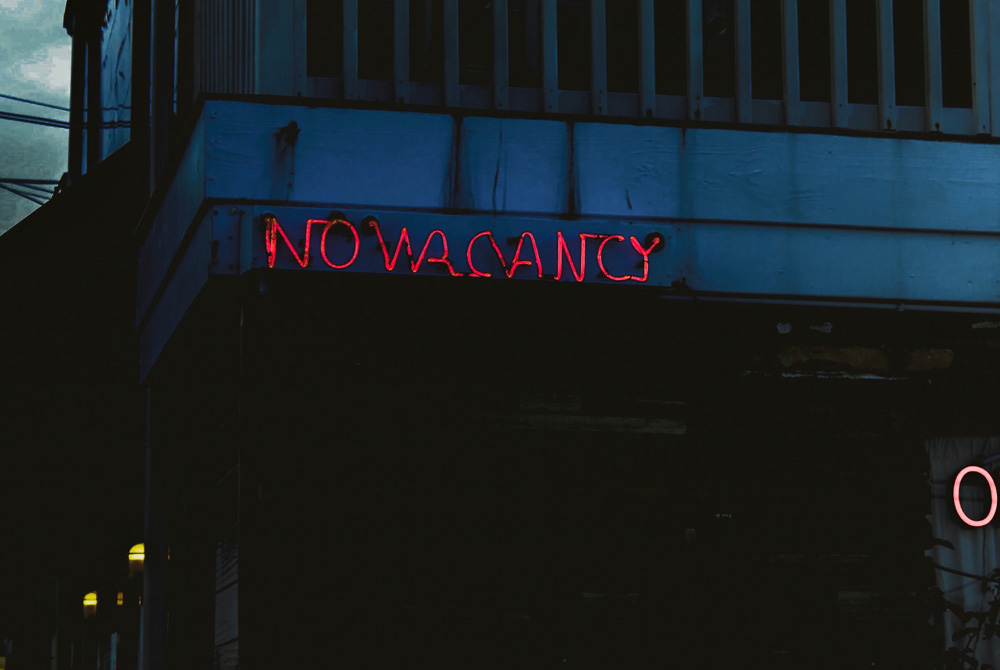
(Unsplash/Samuel Holt)
Months ago, while my mind and heart were whirling after moving from rural Wisconsin to Chicago, I attempted to run a simple and quick errand: buy some shampoo. Another sister went with me, and we carried along a short list of things we needed for our new household. At the store, we found little of what we were looking for, even though the store bore a familiar name and allowed the expectation. I scanned the shelves for the kind of shampoo I like, but all the bottles were unfamiliar and unaffordable. Disoriented and overwhelmed, my body tensed with frustration and disgust. This store didn't have anything I wanted.
In another aisle, I complained to the sister with me. And then, a man approached us, his face looking stressed. He mumbled a request. "Can you help? Can you help me buy some laundry soap? And a few other things for my family?" I barely understood him. I thought, "Why don't people just name what they need? Why don't people speak clearly?" I asked him to speak up; I felt righteous, like a teacher who had the duty of correcting another.
I didn't want to help. I had fears, concerns and questions. I was conflicted and didn't know what to do. In the end, we didn't buy anything for the man, even though the other sister was willing. I took control of the situation even though it wasn't my right or duty. Then we failed to share. We left the store with little of what we came for, yet I brought home a heavy load of guilt for being ungenerous and ungrateful. The man and his needs, my attitude and failure to help: the memory has haunted me ever since.
There was no room.
Now that I am living in a big city once again, I only need to leave the safety of our home and walk a little ways to encounter a person in need: someone who is begging on the sidewalk, outside a high-rise, at an intersection. I want to be available to each person I meet, to listen, and hear their stories, to learn their names. Some hold signs and some hold out cups. Many of them appear overtired, worn, weak. But even though my heart longs to love, to be generous and available, there are times when I am rushing and don't stop, don't smile, don't put anything in their cups. Although I am willing, I fail to offer a greeting or acknowledgement, because I am rushed, because I don't think I can, or because I, too, am numb or tired or weak.
There is no room.
And Joseph too went up from Galilee from the town of Nazareth to Judea, to the city of David that is called Bethlehem, because he was of the house and family of David, to be enrolled with Mary, his betrothed, who was with child. While they were there, the time came for her to have her child, and she gave birth to her firstborn son. She wrapped him in swaddling clothes and laid him in a manger, because there was no room for them in the inn. (Luke 2:4-7)
Thousands of migrants journey across deserts and survive dehydration, hunger, injury and weakness in a modern Exodus story, hoping for a better life (just as many of our own ancestors once did) only to be told that the border is closed, that they are not welcome, that no more people are allowed to enter. They are forced to construct a makeshift refugee camp and sleep more on rocky, dry land, only to await an unknown future.
They are told there is no room.
Advertisement
During these Advent days, many of us have prayed about making room. We are working to prepare the way for God's will in our lives, to prepare ourselves to unwrap and celebrate the deep meaning and joy of the Incarnation. As I have prayed with my desires and longings, along with my failings to be open and receptive, I have noticed that although I would like to offer openness and kindness to those far and near, it's much easier to be idealistic when I am energized and optimistic, than when I am tired and weak. It turns out that offering room begins with the person who is the closest to me: I need to make room for my own need to grow, for my limitations and struggles.
In the longing, I trust my belief: the God of love entered into the mess of the world. The Word became flesh and came to us as a vulnerable and helpless infant, born among animals and into an oppressive empire. Emmanuel, God with us, has entered every human heartache, every troubled mind, every struggling body. Jesus has taught us how to offer presence, generosity and hospitality to everyone in need, no matter the circumstances. Jesus, the true light, has modeled for us how to love freely without counting the cost, without judgement or fear. We are made to imitate him. We are his brothers and sisters. We are children of God.
May we make room.
[Sr. Julia Walsh, Franciscan Sister of Perpetual Adoration, is a retreat director, speaker, educator, activist and award-winning writer who blogs at MessyJesusBusiness.com. Follow her on Twitter: @juliafspa.]





